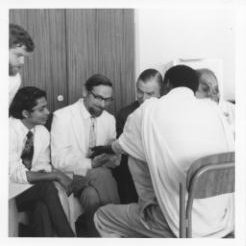Dr Ernest P Fritschi - TLM Hero
Dr Ernest P Fritschi - TLM Hero
Physician, Swiss Indian

Dr Fritschi was born to Swiss parents in Mangalore, in what was then the South Kanara area of Madras State. He grew up in India and studied medicine at the Madras Christian College in the early 1940s. When India achieved its independence, Dr Fritschi took Indian nationality.
His first encounter with leprosy was during his studies at an annual summer conference of the Christian Medical Association of India where he heard a young Dr Cochrane speak. This initial interest was compounded through regular village clinics that he attended through his college, where leprosy was a common occurrence.
He started his life as a leprologist at the Christian Medical College, Vellore working as the research assistant for Dr Brand. It was during this time that he became interested in reconstructive surgery. He became a part of Dr Brand’s efforts to innovate the area of reconstructive surgery and through continued studies, Dr Fritschi became an orthopaedic surgeon working in leprosy.
Dr Fritschi’s stellar career saw him take on the role of Director of the Schieffelin Institute of Health Research and Leprosy Centre, Karigiri, from 1956- 1959 and 1974 – 1987. He not only provided reconstructive surgical and rehabilitative services to leprosy patients, but also initiated a number of training programmes in leprosy. He, along with his wife, Manorama Fritschi, were instrumental in setting up Shanthigramam, a home for the older persons, those who were destitute and leprosy patients near Karigiri. His work also took him to serve in Indonesia and Ethiopia.
For his selfless services to people on the fringe of society, Dr Fritschi was awarded the Damien Dutton Award in 2006 - one of the highest awards given to persons who have contributed immensely to leprosy work.
Rosemary Tootle fondly remembers meeting Dr Fritschi during her time in India. He invited her and a colleague to stay with his family at the hospital in Vadathorasalur so that they could watch him perform reconstructive surgery. She remembers him listening to the Beatles while he performed surgery and trained other surgeons at the same time. She also remembers him as a practical man who drove her and her friend from Vadathorasalur to Karigiri (a four-hour journey undertaken at night). When one of the tires was punctured in the jungle she remembers watching him change it in the dark without batting an eyelid.
Rosemary told us, "Not only was Dr Fritschi one of Paul Brand’s star pupils, he was also his friend. In 1969 they were planning a joint 90th birthday celebration for their mothers. Dr Fritschi had a wry sense of humour, saying 'My mother is not quite as unreasonable as his.'"
In his own humble words, Dr Fritschi sums up his contribution like this,
“My main contribution throughout my 30 odd years of service in leprosy has been in teaching techniques which have been devised and tested and on which a few papers have been written demonstrating the effectiveness of that particular technique and so on. And of course one of the important things is acting as a scaffolding from which more intellectually gifted persons than I could rise to new heights. In other words keeping the home fires burning while the brilliant ones made contributions to the subject... consolidation if you like.”